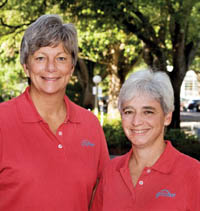Building A Movement
Girls First helps at-risk girls become strong women through sports
 In 1997, Helen Siegel, director of special projects at Corporate Realty, and Missie McGuire, assistant vice president for student affairs at Tulane, started Girls First, a nonprofit organization that provides “sport and movement opportunities to underserved girls” through a weeklong summer camp and activities throughout the year.
In 1997, Helen Siegel, director of special projects at Corporate Realty, and Missie McGuire, assistant vice president for student affairs at Tulane, started Girls First, a nonprofit organization that provides “sport and movement opportunities to underserved girls” through a weeklong summer camp and activities throughout the year.
What does Girls First do? Helen Siegel: We take girls who don’t have access to other opportunities and use sports to build their self-esteem, to keep them off drugs, avoid unwanted pregnancies. It’s not about basketball or volleyball, although we do that. It’s about keeping them active and moving. Missie McGuire: We do a follow-up activity every three to four weeks. It’s a year-round program, because we know we can’t make an impact in a six-day residential sports camp.
What kind of follow-up activities?
MM: We bring the girls to collegiate matches, such as a Tulane women’s volleyball match. We’ve gone on a nature hike.
HS: Dance is huge.
MM: But it is all about getting these kids to feel like they make a difference …
HS: … that they have value and something to contribute to this world.
MM: And the kids go home and share those conversations with parents and grandparents. We had a couple of parents elect to go back and get their GEDs as a result of their daughters’ encouraging them.
Why emphasize sports?
MM: We found that for every four opportunities boys in this age range have, girls have just one.
HS: Schools don’t provide them. Neighborhoods aren’t safe. They can’t go out and play in the streets. Girls don’t have that opportunity to work in teams and learn to share, learn how to win and how to lose.
How do you find the campers?
HS: We have good relationships with different agencies and a couple of at-risk schools.
MM: Our girls come with many different experiences. Our job is to be sure that these experiences no longer define them during the summer camp.
What defines them here is that they’re playing and having fun. And they’re being girls and learning how to become strong women.
What have been your greatest successes?
MM: Several girls have gone to college. That’s probably the most rewarding. We also have kids that have been class valedictorians or student body presidents.
What happened to your girls after Katrina?
HS: We realized that Girls First kept these kids going. We had such a responsibility to build it back up.
MM: Laura Chapman, who was at the Metairie YMCA before the storm, worked at the Astrodome in Houston and saw a couple of our girls there. They were only there because they learned to swim at Girls First. One lost a grandmother who drowned. We teach swimming because every kid should know how to swim. Never in a million years do you think they’re going to use those skills in a catastrophic experience.
You both have demanding careers. What motivates you to set aside time for Girls First?
MM: Every year you get to the camp and think you’re going to drop in your tracks. But it just takes one little girl coming up and sharing why her day was special. How can people help Girls First?
MM: We want the community to be aware of us, so they can get information about Girls First to somebody that needs it.
HS: Or provide opportunities to our girls. A lady at the zoo called a year ago, and said, “I really want you to bring your girls and do an overnight.” They don’t let people just sleep in the zoo, but we did.
MM: Good people find other good people. I’m a firm believer in that. And good people will continue to give and offer things. ?
